|
|
|
Sort Order |
|
|
|
Items / Page
|
|
|
|
|
|
|
| Srl | Item |
| 1 |
ID:
128405
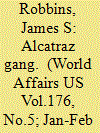

|
|
|
|
|
| Publication |
2014.
|
| Summary/Abstract |
Picture yourself locked "in a dimly lit, windowless concrete box, approximately nine feet long by four feet wide," with a bamboo mat and a bucket, one or both of your ankles locked in irons, left there like a caged animal. Now imagine spending two years there, alone-the isolation interrupted only by routine interrogation and occasional torture sessions, some lasting days-and you are getting close to describing the experiences of a handful of American prisoners of war whose North Vietnamese hosts had designated them as troublemakers. These were the men of Alcatraz. In all, more than three hundred and fifty American servicemen were being held captive by North Vietnam when US involvement ended in 1973. Few tales of American valor are as dramatic and gut-wrenching as those of the Vietnam-era POWs, some of whom were held for eight years, twice the length of US involvement in the Second World War. Defiant, by Alvin Townley, whose previous book chronicled the world of US Navy aviation, is the story of eleven of these captives whose leadership and resistance to their captors' treatment, including efforts to use them for propaganda purposes, caused the North Vietnamese so much trouble they were rounded up, blindfolded, and removed to a special prison they dubbed Alcatraz. They would spend two years there, isolated from the main group of American prisoners, segregated even from one another, forbidden to communicate amongst themselves, and tortured repeatedly for their refusal to capitulate. According to a camp functionary they nicknamed "Rabbit," the Alcatraz Eleven were the "darkest criminals who persist in inciting the other criminals to oppose the Camp Authority." We would call them heroes.
|
|
|
|
|
|
|
|
|
|
|
|
|
|
|
|
| 2 |
ID:
128397
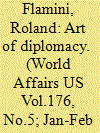

|
|
|
|
|
| Publication |
2014.
|
| Summary/Abstract |
Early in October 2013, a group of high-ranking Greek officials, including Prime Minister Antonis Samaras, came to Washington for the opening of a major art exhibition from their country at the National Gallery of Art. But the black-tie event and the press conference to inaugurate the show, "Heaven and Earth: Art of Byzantium from Greek Collections," were both canceled because of the government shutdown. As a result, a party of angry Greeks left for home muttering darkly about fearing Americans when you bear them gifts. The Greeks were not even allowed a private visit to the exhibition in which virtually every precious icon, ancient manuscript, and piece of mosaic had been loaned by museums and institutions in their country.
|
|
|
|
|
|
|
|
|
|
|
|
|
|
|
|
| 3 |
ID:
128330
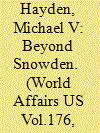

|
|
|
|
|
| Publication |
2014.
|
| Summary/Abstract |
The October 10, 2013, edition of many American papers featured a photo of fugitive NSA contractor Edward Snowden in Russia, surrounded by former NSA executive Thomas Drake, former FBI agent Coleen Rowley, and former CIA analyst Ray McGovern. The three former government officials were in Russia to present Snowden with something called the Sam Adams Award for Integrity in Intelligence. All three had previously won the award themselves, along with WikiLeaks founder Julian Assange and Katharine Gun, a translator for the British intelligence agency GCHQ who alleged NSA plans to tap the communications of UN members in the run-up to the Iraq War.
|
|
|
|
|
|
|
|
|
|
|
|
|
|
|
|
| 4 |
ID:
128396
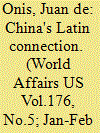

|
|
|
|
|
| Publication |
2014.
|
| Summary/Abstract |
When Brazil opened up its huge offshore petroleum discoveries to foreign developers in October, after holding off on a decision for six years, government leaks indicated that Chinese state oil companies would dominate the bidding for the estimated reserve of eight to twelve billion barrels of oil. When the bids were opened, however, the Chinese proved to be far more cautious than expected and took only a minority participation in the winning consortium dominated by Petrobras, the Brazilian state oil company, and two major Western multinationals, Royal Dutch Shell, the Anglo-Dutch giant, and Total, the largest French oil company.
|
|
|
|
|
|
|
|
|
|
|
|
|
|
|
|
| 5 |
ID:
128395
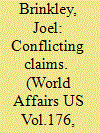

|
|
|
|
|
| Publication |
2014.
|
| Summary/Abstract |
Most everyone has heard of the South China Sea debate, the enduring argument between China and most every other state that has a coastline on that waterway. From Indonesia to the Philippines, every state is angry with China over its claim that it maintains full ownership rights to nearly all of the sea's islands and resources.
|
|
|
|
|
|
|
|
|
|
|
|
|
|
|
|
| 6 |
ID:
128392
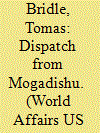

|
|
|
|
|
| Publication |
2014.
|
| Summary/Abstract |
We first saw Somalia's Parliament building from a distance, at the top of a hill overlooking Mogadishu and behind the closed arm of a checkpoint barrier. Our meeting with the speaker of Parliament was scheduled for 9:30 that morning, but the Ugandan soldiers manning the checkpoint-part of the African Union Mission in Somalia-would not let us proceed. Our names are not on the list of people with meetings in the Parliament, they told us, and they could not allow people not on that list to pass. There followed a flurry of phone calls to the aides who had arranged the meeting. But the soldiers, while polite, remained firm. They had their orders. We went back through town and tried to reach a group of MPs at another government building, but were again turned away. We consoled ourselves by noting that the soldiers' commitment to following the protocol for access to government buildings was a promising sign of their discipline and improving security conditions, but decided that it was time to give up trying to make the meeting happen that day.
|
|
|
|
|
|
|
|
|
|
|
|
|
|
|
|
| 7 |
ID:
128400
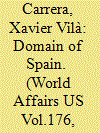

|
|
|
|
|
| Publication |
2014.
|
| Summary/Abstract |
A specter is haunting Spain. It comes from a promise made on November 13, 2003, by José Luis Rodríguez Zapatero, then secretary general of Spain's Socialist Party and a candidate for prime minister of the country. "I will support any reform of the Catalan Statute of Autonomy approved by the Catalan Parliament," he told twenty thousand people gathered in Barcelona's Palau Sant Jordi, referring to the law that oversees the government of Catalonia. Then, to the delight of an astonished audience, he went on to recite, in Catalan, a verse by the beloved poet Miquel Martí i Pol. Zapatero's words resonated strongly among the left-wing establishment poised to make history in the Catalan election three days later.
|
|
|
|
|
|
|
|
|
|
|
|
|
|
|
|
| 8 |
ID:
128403
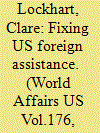

|
|
|
|
|
| Publication |
2014.
|
| Summary/Abstract |
In 2002, during the early stages of Afghanistan's reconstruction process, I sat in a remote part of Bamiyan Province with a group of villagers who told me how excited they had been several months before, when a $150 million housing program from a UN agency had been announced on the radio. They felt the program, which promised to bring shelter to their communities, would transform their lives. They were shocked, however, to discover soon after that this program had already come and gone-with very little change to their lives. Indignant, as well as curious, they decided to track the money and find out what had happened to the program that, as far as they were concerned, had never been. Becoming forensic accountants, they went over the files and figures and found that the original amount granted by the UN had first gone through an aid agency in Geneva that took twenty percent off the top before sub-contracting to a Washington-based agency that took another twenty percent. The funds were passed like a parcel from agency to agency, NGO to NGO, until they limped to their final destination-Afghanistan itself. The few remaining funds went to buy wood from Iran, shipped via a trucking cartel at above-market rates. Eventually some wooden beams did reach the village, but they were too heavy for the mud walls used in construction there. All the villagers said they could do was cut up the wood for firewood, sending $150 million literally up in smoke
|
|
|
|
|
|
|
|
|
|
|
|
|
|
|
|
| 9 |
ID:
128394
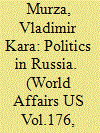

|
|
|
|
|
| Publication |
2014.
|
| Summary/Abstract |
The Kremlin's decision to call a snap election for Moscow mayor in September 2013 may be remembered as a turning point both for Vladimir Putin's regime and for the Russian opposition. For years, the strength of the Putin government has depended not only on its heavy hand but on the lack of an alternative. This vacuum was created and maintained, of course, by the heavy hand itself-shutting down unwanted television channels, disenfranchising (and sometimes jailing) political opponents, and fixing elections. And, for a time, it worked. The shrewdest of Kremlin apologists, both in Russia and abroad, have long ceased to praise the regime, occasionally even admitting its corrupt and repressive nature, but invariably asking, "If not Putin, then who?"
|
|
|
|
|
|
|
|
|
|
|
|
|
|
|
|
| 10 |
ID:
128331
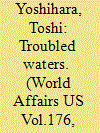

|
|
|
|
|
| Publication |
2014.
|
| Summary/Abstract |
Japan and China have been staring each other down in the East China Sea for well over a year now. Since Tokyo nationalized the Senkaku/Diaoyu Islands in September 2012, Chinese "maritime law enforcement flotillas" have been making the rounds in the disputed waters near the islands. China insists that the regular patrols are routine and normal. Japanese Coast Guard vessels have been working overtime to monitor and trail every Chinese intrusion, lest Tokyo concede Beijing's jurisdictional claims. Before this so-far low-decibel crisis began, it seemed unlikely that China would be willing to contest Tokyo's sovereignty over the uninhabited islands-islets is actually a better term to describe them-and administrative control over surrounding waters for as long as it has. And even fewer thought that Japan would be straining for an appropriate response. It is a testament to changing assumptions about China's growing ambitions that this protracted test of wills has gone largely unreported in the Western press. This cat-and-mouse game has seemingly become the new normal in maritime Asia.
|
|
|
|
|
|
|
|
|
|
|
|
|
|
|
|
| 11 |
ID:
128393
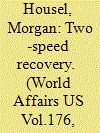

|
|
|
|
|
| Publication |
2014.
|
| Summary/Abstract |
The August 2013 gross domestic product report by the US Bureau of Economic Analysis drew little attention, but it contained a fairly remarkable piece of data: Inflation-adjusted GDP per capita in the United States hit a new all-time high in the second quarter of 2013, the first time a new high had been reached since 2007. Real consumer spending has hit a new high, too, and auto sales are at levels not seen since before the financial crisis. Millions of Americans are still searching for work and suffering financial hardship, but on average, by the broadest measures of economic performance, America's Great Recession is over. Few nations across the Atlantic can say the same. The eurozone slipped back into recession in 2012 for the second time in four years, and remains in an economic state that can be accurately described as miserable. Real economic output among eurozone nations remains three percentage points below its 2008 peak. Eurozone unemployment sits near twelve percent in late 2013, higher than the US ever experienced at the peak of its recession. These problems are as deeply human as they are economic or political. Each percentage point rise in Europe's unemployment rate has boosted its suicide rate by 0.79 percent, according to a study published in the medical journal the Lancet.
|
|
|
|
|
|
|
|
|
|
|
|
|
|
|
|
|
|
|
|
|